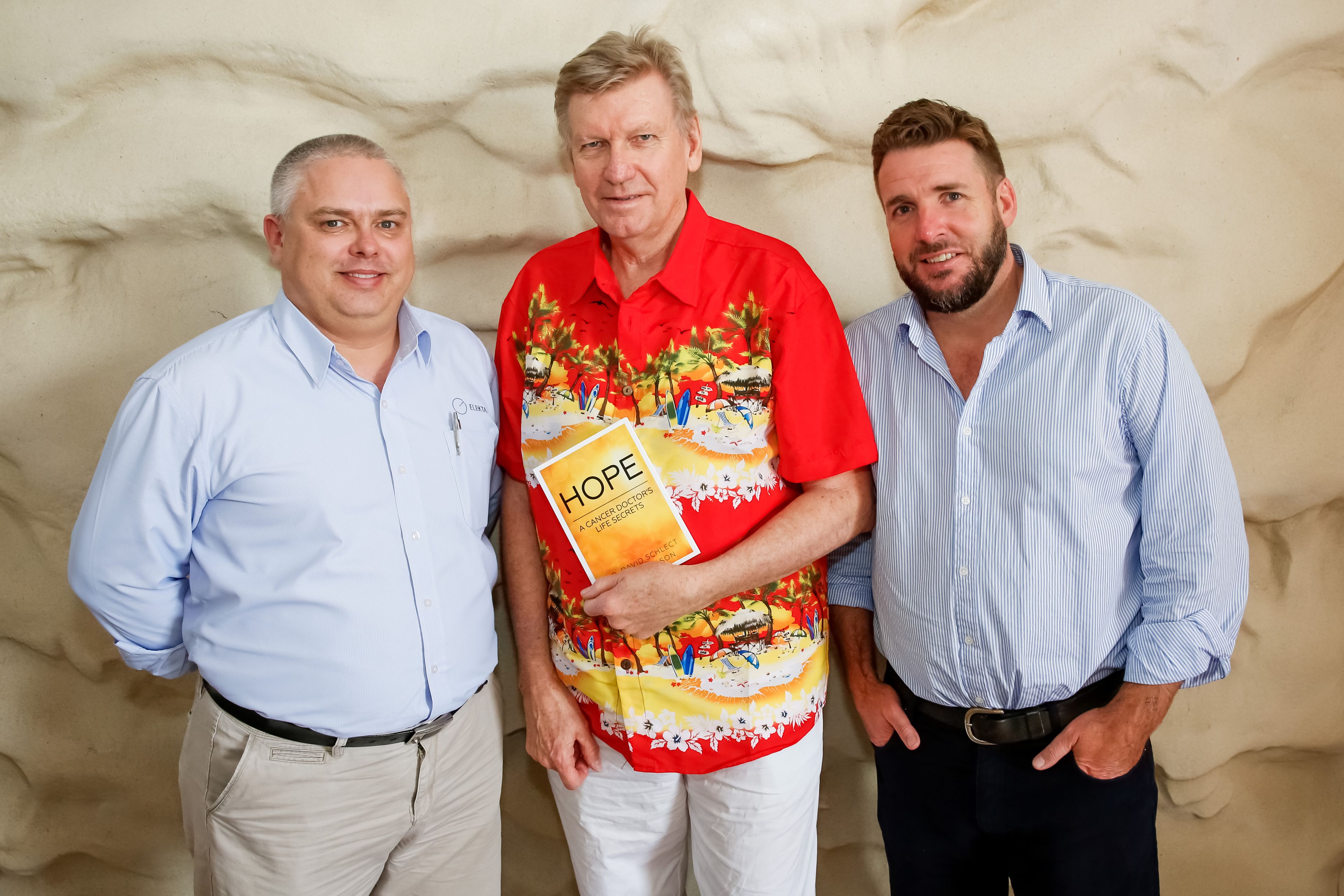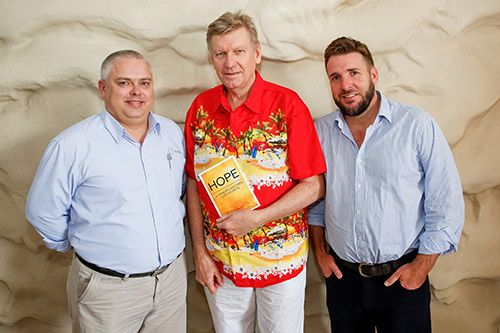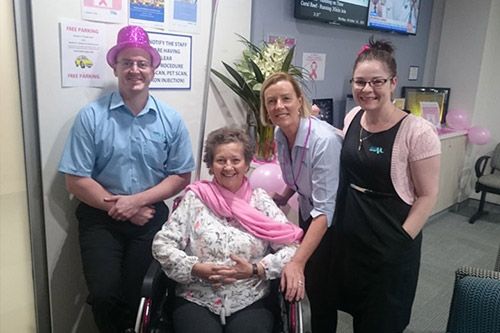Through the pall of a cancer diagnosis, a ray of hope

Genesis CancerCare radiation oncologist and therapist team up to write book on their patient’s courage
There can be few more jarring events in one’s life than the diagnosis of a serious, possibly lethal disease. Healthy individuals imagining it happening to them might envision themselves withdrawing into a perpetual state of dread and hopelessness, morosely pondering their future.
However, according to Genesis CancerCare Queensland’s (Brisbane, Australia) radiation oncologist David Schlect, MD and radiation therapist Damian Mason, most of their patients with cancer respond – after the initial shock – with a remarkable courage and resilience. Fueled by hope, their patients rise above their personal predicaments and choose to live, love and laugh – to wring every precious moment from lives suddenly thrown into chaos.
In their 2014 book, HOPE | A Cancer Doctor’s Life Secrets, David and Damian relate how individuals undergoing treatment for cancer gain a new perspective on the important things in life and discover the capacity to persevere through the ups and downs of their treatment journey.

The authors – who have a combined experience of half a century of relating with and observing thousands of patients – note that the common denominator among patients who seem to thrive amidst the travails of their illness is their adoption of an attitude of hope. Hope, Damian and David assert, is an active, adaptive response to their patients’ situation, “encapsulating one’s ability to remain motivated and committed to the attainment of a goal – despite tremendous adversity – and the ability to assess and implement a plan to facilitate this goal.”
Wavelength interviewed Damian and David about HOPE.
WL: What motivated you to write this book?
David: It was a desire to do something to lift the mood of patients undergoing treatment. Damian has a very cheerful, positive and optimistic disposition; he is the therapist and I am the doctor at the front. I tell patients if they’re feeling down they should speak to Damian and he’ll cheer them up. He advises patients he is seeing to see David and he’ll cheer them up.
The idea for a book was initially an academic exploration on how to address depression and anxiety related to a cancer diagnosis.
There is a lot written on this topic, and while it provided some insights on how to help patients, it didn’t really speak of a solution until we came upon the concept of hope. We felt hope was fundamental, useful and was positive. It resonated with us as something that would lift the spirits of people going through treatment. It also has the benefit of being quite quick, even very small exchanges like saying something positive to someone can lift their spirits and attitude of hope. The response is often intuitive and the benefits can be long-term and that’s what we define as hope.

Damian: We wrote it for patients, but also for their family and friends. Many of us have a friend, neighbor or family member who has received a cancer diagnosis and it can leave the healthy person feeling quite disempowered – you don’t really know what to do to help that individual because you’re not in that position. We tried to use some of the research in that field, but in particular, we tried to capture the observations of what our patients have done very well over the years and that has led to very good outcomes. Not just from a clinical perspective, but just in terms of how they’ve adapted and gone on with their lives.
WL: What have you observed about many of your patients as they go through treatment?
Damian: Patients are faced with a choice to give up on life or go on living. In our experience, most choose to stay actively involved and participate in life. They continue to involve themselves in their interests, their work, their social activities and in doing so they seem to be less impacted by the cancer diagnosis and the associated treatments and side effects. It’s about the meaning or purpose that these individuals derive from their interpersonal relationships and the things they’re interested in or enjoy.
David: Two additional aspects that we outline in HOPE are “love” and “laugh.” A crucial factor in addressing the challenges of cancer treatment is the love and support that patients receive from their relationship with their family and friends. The patients’ human connections give them a tremendous amount of purpose and meaning in their lives. Patients who do best over their treatment course are those who choose to love; they choose to access and accept the love and support of their family and friends.
Laughter is another quite universal quality, so even in people who are desperately unwell, levity can be of great use. A humorous moment or a funny thing is really a strong medicine. It doesn’t have to be like a comedy show, but humor’s got this…it’s a brief thing isn’t it? A brief and unexpected thing very often. So, one’s caregiver may say something humorous or light and it takes the patient by surprise and it’s uplifting and it increases hope.
WL: Do you draw a distinction between patients with curable cancer versus those with terminal cancer?
David: No, we don’t. Hope is a fundamental and universal quality and it’s within all of us all of the time. It invests every single action at every single minute of our day. In the case of a person with serious, incurable cancer, the hope might be rearranged in terms of its scale. Someone with a day to live might hope that their daughter visits them or that they have a cup of tea with their loved ones, or there might be some pain relief that will help further. We’ve done some research that has shown, in fact, that expectations are often mismatched. For example, someone who is told they have 99.9% curable skin cancer may feel that they’re about to die, whereas the person with stage IV pancreatic cancer with just days to live often feel there is something that will cure them.
WL: Is a patient’s transformation to a state of elevated hope like Kubler-Ross’s five stages of grief: denial, anger, bargaining, depression and acceptance?
David: Damian and I talked about this and we think it’s mixed. Again, hope is this universal notion; it invests every stage. You can have shock and yet the answer might be hope. You can have denial, but again, the rationalizing of that might be that there’s hope – in other words, it might be that they could benefit from some treatment that could apply to stage IV lung cancer.
Damian: The Kubler-Ross model describes a more linear progression, whereas the cancer treatment journey is filled with ups and downs, like an ocean ebbing and flowing. One moment it’s quite calm and serene, the next minute the surf has really picked up and it’s crashing into the rocks. A situation like that can diminish hope, so that’s why the way the nursing team, the therapist and the oncologist respond has a significant influence on how that individual reacts.
WL: Is there a personality type associated with those who do well throughout their therapy versus those who don’t?
David: What we do know is that people who are depressed don’t do well with their treatment. There’s an enormous benefit from a positive, optimistic, hopeful attitude – that’s often called the quality of life. In terms of survival, we think people who are positive or hopeful will actually live longer. For example, if a new drug were to emerge for end-stage liver cancer, it’s unlikely to be as effective as being hopeful as opposed to despairing. Despair is the opposite of hope and it’s a very negative factor in terms of mood, quality of life and, we think, survival. Hope is as strong as a new drug.
Damian: I’ve treated severely depressed patients over the years and it’s almost like they’ve got a fortress around them. One of the great aspects of radiation oncology, in particular, is that there is a daily interaction with these people. Over time you can develop both a professional and personal connection, and as those roots start to burrow down a bit you do see a lightening in mood and a new approach to what they’re doing day to day.
WL: How have your experiences with cancer patients changed your own perspectives on life?
Damian: Over the last decade there’s been a focus on mindfulness, and for myself it is just being present in the moment. Working in oncology, I think I’ve developed that aspect of my life. Being present in the moment makes you become a lot more grateful for what it is you’re doing. You may be having a tough day at the office, but just next door to you is a mother of three with terminal breast cancer. So, it’s very humbling and a privilege to be dealing with these people and their family members and realizing that you shouldn’t take any moment or day for granted.
David: We live, love and laugh and to live for me is invested in my work. We love our work and we live it. I also live my after-work activities. I think love is a very important notion. And then to laugh, to enjoy it as you go – to enjoy the laughs and these are crucial.
The meaning in my life is in some way linked to my work and what I do as I’m sure Damian would agree. It’s both a privilege and an honor to be taken into one’s confidence. To know more about the people and their lives and how they respond is an incredible human engagement.
WL: How applicable are the concepts in HOPE to healthy people?
David: Hope is a completely fundamental quality that we are largely unaware of in our daily life, yet it invests every second of our day. It applies to everyone – it’s the capacity to look at things that have meaning in our life and use that in a positive, constructive way.
Damian: I think there is a real opportunity for people who haven’t had a cancer diagnosis. In the cancer clinic, you can see hope at work in the patients and in their family and friends sitting in the waiting room. You can see a subtle or even significant transformation in terms of their attitude and behavior over the course of a person’s treatment. All of a sudden the little things that may have irritated them or frustrated them are no longer an issue, because their loved one is going through something that is much worse and more demanding than the issues of a day in a healthy person’s life. We can get caught up in the little things too much and not be really aware of what is most significant and meaningful in our lives.
If interested to read more, you may purchase the book here.
“Remember Red, hope is a good thing, maybe the best of things, and no good thing ever dies.” ~ Andy Dufresne, The Shawshank Redemption (1994)
